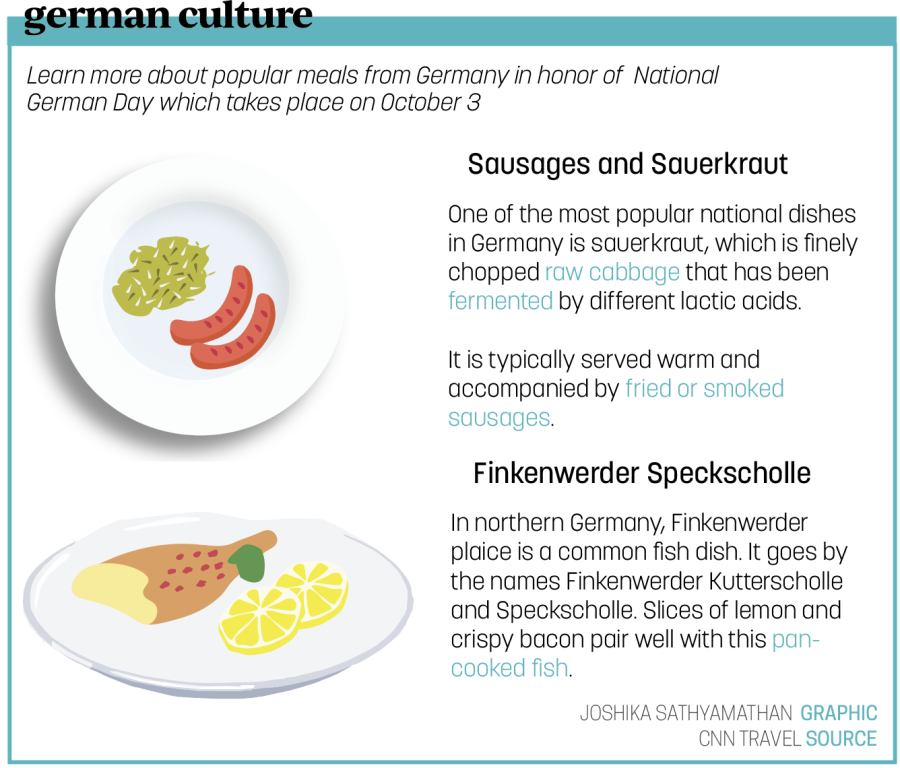National German Day is a day of unity in Germany and a day of celebration and cultural affinity worldwide. At this school, German Day is a widely celebrated holiday as many students are of German heritage or celebrate some aspect of German culture. It is also important nationally as it is a day of unity between East and West Germany after the Cold War. The unification of Germany is celebrated on Oct. 3, but National German Day is celebrated on Oct. 6.
For junior Beatrice Dyas, National German Day is a holiday shared between her and her sister who are both fluent in German and who share an appreciation of German culture. Dyas and her family also celebrate many German holidays and traditions that she finds special to her.
“For me, it is very personal because I’ve been a German student for a long time. I wanted to learn a language that I could talk to my sister and my parents don’t know what we’re saying,” Dyas said. “But I really got into it because I find the culture really interesting….”
Dyas is not the only person at CHS who celebrates National German Day or German culture. She is among many who celebrate German culture or associate with German heritage.
For German teacher Angelika Becker, National German Day is significant because of her background. Being a German-American, Becker finds herself identifying with both German and American culture. On that day, she can finally celebrate both at the same time.
“… It has a bigger significance to me personally because that is what I am: German by birth, American by choice,” Becker said. “On that day, we celebrate what German culture has contributed to American culture… there were so many people that immigrated from Germany into the United States [who] really helped build the foundation of the United States.”
Dyas said her favorite part of German culture were the holidays, especially Weihnachten, German Christmas. She finds German holidays more engaging than the holidays celebrated in the United States.
“I love the way the holidays are celebrated. I love Weihnachten and Krampus, the monster who goes to childrens’ houses… There’s also festivals and people in Krampus costumes dancing and trying to terrify all the children [into being good],” she said. “I think that’s so fun… Like why don’t we have anything like that?”
Being a German teacher at CHS, Becker has seen Germany in many perspectives, one of which was discrimination. Germans are often portrayed as unfriendly and militaristic, especially during the two world wars and after the Holocaust.
“Before WW1, [National German Day] was always recognized. During and after World War I, not so much anymore because the United States had been in a war with Germany,” Becker said. “During and after World War II and during the 50s, you didn’t even want to admit that you were of German heritage. But after the 70s and 80s, Germany became allies with the United States, and Ronald Reagen declared Oct. 6 a holiday.”
Senior Laura Martens feels as if German culture is often stereotyped and misunderstood. She hopes that through National German Day, more people will start to appreciate German culture more.
“A lot of people in America have German heritage, but I think a lot of people aren’t connected to it. National German Day is really cool because you [see that] all of these things we see as American are actually German,” she said. “There are also a lot of stereotypes about Germany so I think it’s a way for Americans regardless if they’re German descendents or not to understand Germany better.”
No matter the stereotypes, Dyas will forever see Germany as a way for her family to connect and a way for her to educate others on what she is most passionate about.
“[My sister] is doing a minor in German at her college right now and so on German Day we always do facetime and speak more German that day… I also volunteered at Christkindlmarkt and got to teach kids about German traditions,” she said. “There’s something about German culture that I just like.” By Sophia Zhang































![What happened to theater etiquette? [opinion]](https://hilite.org/wp-content/uploads/2025/04/Entertainment-Perspective-Cover-1200x471.jpg)













































![Review: “The Immortal Soul Salvage Yard:” A criminally underrated poetry collection [MUSE]](https://hilite.org/wp-content/uploads/2025/03/71cju6TvqmL._AC_UF10001000_QL80_.jpg)
![Review: "Dog Man" is Unapologetically Chaotic [MUSE]](https://hilite.org/wp-content/uploads/2025/03/dogman-1200x700.jpg)
![Review: "Ne Zha 2": The WeChat family reunion I didn’t know I needed [MUSE]](https://hilite.org/wp-content/uploads/2025/03/unnamed-4.png)
![Review in Print: Maripaz Villar brings a delightfully unique style to the world of WEBTOON [MUSE]](https://hilite.org/wp-content/uploads/2023/12/maripazcover-1200x960.jpg)
![Review: “The Sword of Kaigen” is a masterpiece [MUSE]](https://hilite.org/wp-content/uploads/2023/11/Screenshot-2023-11-26-201051.png)
![Review: Gateron Oil Kings, great linear switches, okay price [MUSE]](https://hilite.org/wp-content/uploads/2023/11/Screenshot-2023-11-26-200553.png)
![Review: “A Haunting in Venice” is a significant improvement from other Agatha Christie adaptations [MUSE]](https://hilite.org/wp-content/uploads/2023/11/e7ee2938a6d422669771bce6d8088521.jpg)
![Review: A Thanksgiving story from elementary school, still just as interesting [MUSE]](https://hilite.org/wp-content/uploads/2023/11/Screenshot-2023-11-26-195514-987x1200.png)
![Review: "When I Fly Towards You", cute, uplifting youth drama [MUSE]](https://hilite.org/wp-content/uploads/2023/09/When-I-Fly-Towards-You-Chinese-drama.png)
![Postcards from Muse: Hawaii Travel Diary [MUSE]](https://hilite.org/wp-content/uploads/2023/09/My-project-1-1200x1200.jpg)
![Review: "Ladybug & Cat Noir: The Movie," departure from original show [MUSE]](https://hilite.org/wp-content/uploads/2023/09/Ladybug__Cat_Noir_-_The_Movie_poster.jpg)
![Review in Print: "Hidden Love" is the cute, uplifting drama everyone needs [MUSE]](https://hilite.org/wp-content/uploads/2023/09/hiddenlovecover-e1693597208225-1030x1200.png)
![Review in Print: "Heartstopper" is the heartwarming queer romance we all need [MUSE]](https://hilite.org/wp-content/uploads/2023/08/museheartstoppercover-1200x654.png)



